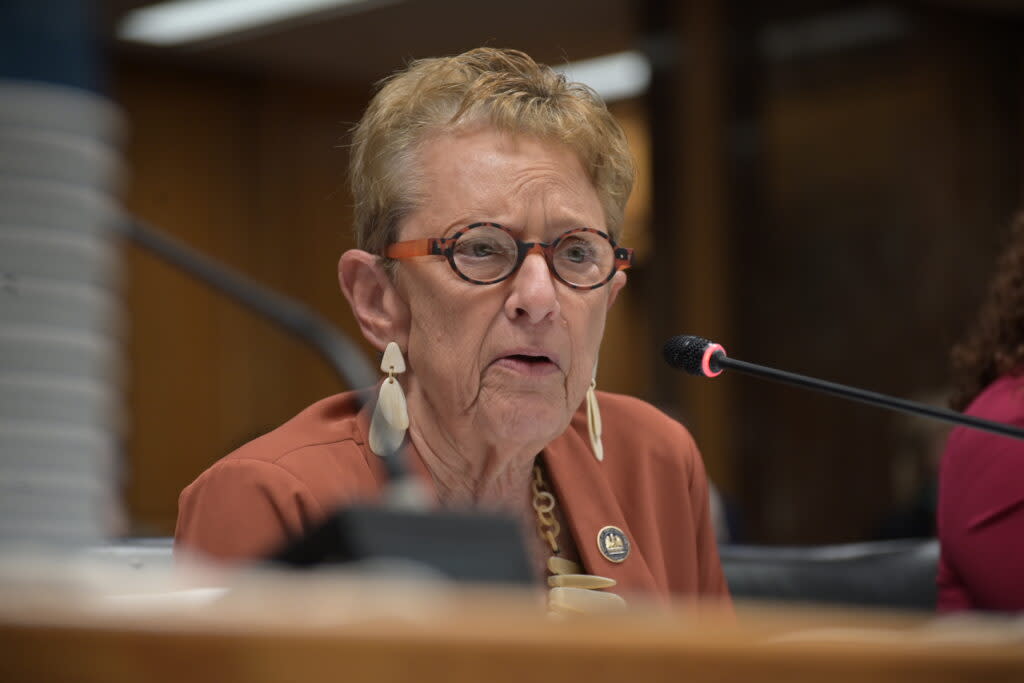Special education, income quotas could be removed for charter school enrollment

Rep. Barbara Freiberg authored the bill that would remove student enrollment quotas for charter schools. (Allison Allsop)
Louisiana charter schools might soon be able to remove certain enrollment requirements for students with disabilities and economically disadvantaged students. It’s a move that parents of those students feel limits their options in a school system based on choice.
House Bill 708, authored by Rep. Barbara Freiberg, R-Baton Rouge, moved out of the Senate Education Committee on Wednesday, despite initial pushback from some committee members and the public. It heads next to the Senate floor and, if approved, would have to go back to the House for concurrence on a committee amendment.
In 2015, former Sen. Dan Claitor authored a bill to add the language to state law that Freiberg is trying to remove. Claitor spoke to the committee in opposition to Freiberg’s bill.
Under Claitor’s bill, certain charter schools must have a percentage of students equal to 85% of the disabled or economically disadvantaged students in the local school district.
For example, if 55% of a local school district’s population is economically disadvantaged students, 46.75% of the charter school’s enrollment must be economically disadvantaged students.
Sen. Beth Mizell, R-Franklinton, questioned the reasoning behind Freiberg’s bill.
“I am a hundred percent charter, but I don’t understand the resistance,” Mizell said. “I don’t understand taking the rule out that gave us the only protection saying charters are absolutely fair across the board.”
Proponents of Freiberg’s bill said the quotas are unfair because charter schools are held to a higher standard than other public schools. Standard public schools are not required to enroll a certain number of students with disabilities or economic disadvantages.
“The quotas only give people who have an ax to grind an ability to go in to be able to cause harm,” said Kenneth Campbell, previously the executive director of charter schools for the Louisiana Department of Education.
Some charter schools have selective admissions and have resisted providing special education services, although they’re required at public schools under state and federal law.
GET THE MORNING HEADLINES DELIVERED TO YOUR INBOX
Proponents also argued it is not fair to require that parents provide their household income or children’s disability details on charter school applications when public schools do not require the same information for enrollment.
Opponents of the bill reminded the committee that since Claitor’s law was enacted in 2015, the number of charter schools in compliance with the enrollment quotas has increased but is still not adequate.
According to a Louisiana Legislative Auditor report in 2022, 10.3% of charter schools required to serve a specific number of economically disadvantaged students did not meet the requirements. The rate is an improvement from the 2016-17 school year, when 21.3% charters did not reach their quota.
The report also says multiple schools repeatedly failed to meet the economically disadvantaged requirement. It did not include information on how many schools were meeting the requirement for students with disabilities.
Opponents of Freiberg’s bill were also concerned that removing the quota would allow “bad actors.”
“If we remove that requirement for charter schools to even serve those populations, there are going to be schools that figure out ways to avoid serving those children,” said Tania Nyman, an education advocate from East Baton Rouge Parish. “And that is not going to be beneficial for the community at large.”
Although the proposal removes “goal lines” for charter schools, it still requires the Board of Elementary and Secondary Education to create rules and regulations to oversee charter schools in this capacity. The stipulation was added as an amendment in committee.
Ashley Townsend, deputy policy chief for the Louisiana Department of Education, explained to committee members that BESE would essentially create a complaint process for parents to turn to if they feel that a charter school is discriminating against children with disabilities or those who are economically disadvantaged.
Ben Lemoine, BESE’s executive director of governmental relations, indicated that board members support Freiberg’s legislation.
The post Special education, income quotas could be removed for charter school enrollment appeared first on Louisiana Illuminator.

